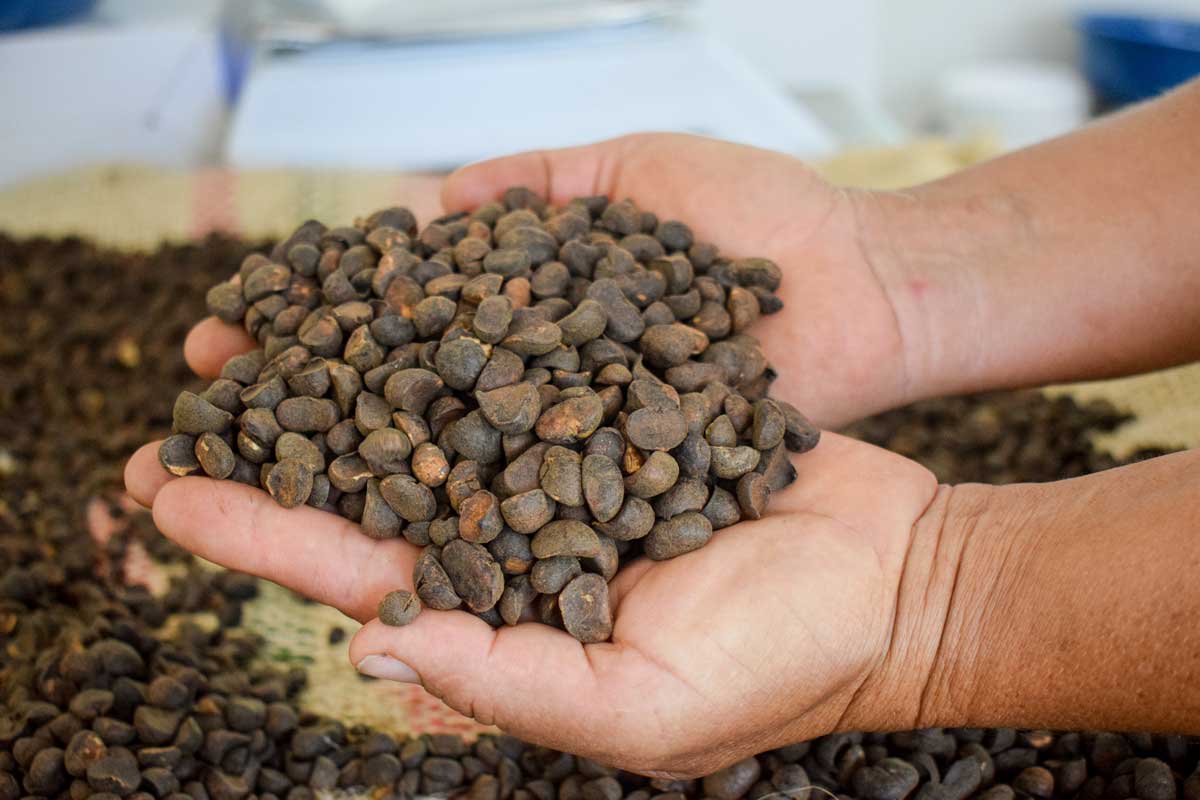Maya Nut Institute finds ourself at a crossroads: For 15 years we have worked to restore the Maya Nut to the local menu in Latin America and the Caribbean. Maya Nut was a staple food for paleolithic hunter gatherer cultures throughout the neotropics. Today it is rare to find people who know it is edible, much less consume it regularly! As a result of the loss of traditional knowledge about Maya Nut, it has been logged ruthlessly and we estimate that less than 5% of the original Maya Nut forest cover remains. This is problematic, particularly in light of the fact that Maya Nut is a critical food source for 85% of neotropical birds and mammals, and also because of the important ecosystem services it provides, including protection of soils and watersheds, and CO2 sequestration.
Thankfully Maya Nut is slowly gaining traction in Central America, México and the US. It is currently classified as a “superfood” in certain boutique markets, due to its nutritional content and its high concentration of antioxidants. While current market demand is miniscule, we predict rapid growth in demand in the coming years.
As we work to develop strategies to increase demand, production and consumption, we have started to develop sustainable management strategies. Donors, forest managers and consumers increasingly demand proof of sustainable management and natural/organic production of products, and some of the more discerning buyers demand participation of small producers and local communities and proof of fair compensation and distribution of profits.
Certifications exist that could be adapted to address sustainability and consumer demands yet these certifications are too expensive for most Maya Nut producer groups.
Maya Nut is a labor-intensive wild-harvested rainforest product with high production costs[1]. Maya Nut Institute has worked for 15 years to empower rural women producers to earn fair wages for their work. While this maximizes economic benefits to producers, it reduces the profit margin to intermediaries and distributors. Because of the small profit margin, novelty of the product, and consumers habituation to cheap tropical commodities (coffee, sugar, bananas, etc.) based on unfair compensation to rural producers and workers, it is not economically feasible for producers to pass the cost on to consumers at this point in the nascent market. In response to this, we have created an Integrated Self-Certification Program which is affordable to producers and will not notably increase costs to consumers.
Maya Nut Certified™ at this stage is designed to certify producers. Eventually we hope to develop a certification for Maya Nut intermediaries, distributors and companies. This certification guarantees a natural, sustainable, fair trade, women’s product to consumers. If producers were to finance these certifications individually via conventional certification programs, to obtain 3 of the key certifications (Organic, Fair Trade, Sustainable Wild Harvested) would cost upward of $18,000 in the first year and an average of $5,000 every year thereafter. Because none of the producer groups currently operating has this capital available, we devised a participatory, integrated self-certification. Certification is an effective tool to motivate and reward Maya Nut producer groups that adhere to the highest socioeconomic and environmental standards. For consumers this certification serves to guarantee sustainability, fair trade, gender equity and production without the use of harmful pesticides and fertilizers.
Table 1: Cost of Conventional Certification
| CERTIFICATION | CERTIFYING AGENCY | INITIAL COST | ANNUAL COST |
| Fair Trade | FloCert | $3,000-$6,000 | $2,000 |
| Organic | MayaCert | $4,000-$5,000 | $2,000 |
| Sustainable | FairWild or Dept. of Forestry | $4000-$6,5000 | $1000 every 5 years |
| Women’s product | not sure, maybe MayaCert? | Not sure | Not sure |
| TOTAL | $11,000-$17,500 | $4,000 |
Our certification standard is based on criteria of sustainable management, harvesting, processing, and commericalization of Maya Nut. The Maya Nut Certified™ criteria incorporate and integrate relevant mechanisms, norms, indicators and atributes of existing and accepted standards including:
- Forest Stewardship Council (FSC)
- Utz Certified
- FairWild
- Rainforest Alliance
- National Council of Women’s Business Enterprise
- Café de Mujer (Coffee from Women)
- Wild Harvested standard of USDA
- International Standard for Sustainable Wild Collection of Medicinal and Aromatic Plants (ISS-MAP, IUCN)
- Certified Naturally Grown
- Organic Certification standards of the USDA, MayaCert and Oregon Tilth
- Fair Trade Labelling Organization (FLO-Cert)
The Maya Nut Certified™ standard is applicable to Maya Nut harvested from natural forests, forest patches, riparian areas, individual trees interspersed in coffee or other agricultural plantations and agroforestry systems. Monoculture plantations and producer groups or individuals that depend on hired/contract labor do not qualify for Maya Nut Certified! certification. Maya Nut producers who harvest from plantations that apply chemical fertilizers or pesticides during any part of the year do not qualify for Maya Nut Certified™ certification.
[1] Production costs of many tropical commodities are high, but their production offsets the real cost of production by way of heavy reliance on child labor (cofffee), unfair wages paid to workers (coffee, sugar, bananas, etc.), and sanctioned and unsanctioned land-grabbing (fruit, palm oil, coffee, rubber, timber). Maya Nut production does not rely on these “subsidies” and therefore its price reflects the real cost of production incurred by the producers.





